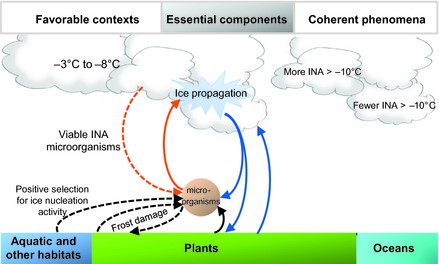Pseudomonas syringae: Bioprecipitation Mechanisms and Implications: Difference between revisions
From MicrobeWiki, the student-edited microbiology resource
No edit summary |
No edit summary |
||
| Line 1: | Line 1: | ||
<!-- Do not edit this line-->{{Curated}} | <!-- Do not edit this line-->{{Curated}} | ||
==Section== | ==Section== | ||
[[Image:Project Pic.jpg|thumb|800px|right|The bioprecipitation cycle diagram with two key factors that highlight the system. First, micro-organisms such as P.syringae that conduct the ice nucleation process. Second, the water vapor from plants, oceans, and aquatic environments that these micro-organism use in the atmosphere. http://onlinelibrary.wiley.com/doi/10.1111/gcb.12447/epdf.]] | [[Image:Project Pic.jpg|thumb|800px|right|Fig.1 The bioprecipitation cycle diagram with two key factors that highlight the system. First, micro-organisms such as P.syringae that conduct the ice nucleation process. Second, the water vapor from plants, oceans, and aquatic environments that these micro-organism use in the atmosphere. http://onlinelibrary.wiley.com/doi/10.1111/gcb.12447/epdf.]] | ||
<br>By Brandon Byrd <br> | <br>By Brandon Byrd <br> | ||
Revision as of 02:58, 22 April 2016
Section

Fig.1 The bioprecipitation cycle diagram with two key factors that highlight the system. First, micro-organisms such as P.syringae that conduct the ice nucleation process. Second, the water vapor from plants, oceans, and aquatic environments that these micro-organism use in the atmosphere. http://onlinelibrary.wiley.com/doi/10.1111/gcb.12447/epdf.
By Brandon Byrd
Introduce the topic of your paper. What is your research question? What experiments have addressed your question? Applications for medicine and/or environment?
Sample citations: [1]
A citation code consists of a hyperlinked reference within "ref" begin and end codes.
Section 1
Include some current research, with at least one figure showing data.
Every point of information REQUIRES CITATION using the citation tool shown above.
Section 2
Include some current research, with at least one figure showing data.
Section 3
Include some current research, with at least one figure showing data.
Section 4
Conclusion
References
Authored for BIOL 238 Microbiology, taught by Joan Slonczewski, 2016, Kenyon College.
